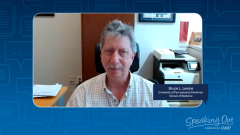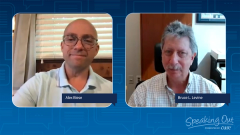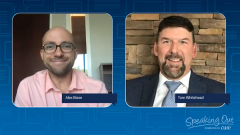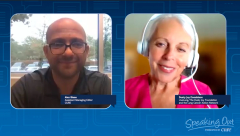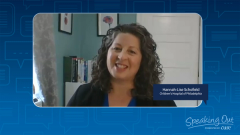
The Evolving Psychosocial Needs of Young Patients With Cancer and Their Families
As part of its Speaking Out video series, CURE spoke with Hannah-Lise Schofield of the Children’s Hospital of Philadelphia about the psychosocial needs of young patients with cancer and their families as well as how those needs change over time.
Episodes in this series
Transcription:
Alex Biese: Hi, my name is Alex Biese. I'm the assistant managing editor of CURE magazine. In this edition of the "Speaking Out" video series, on behalf of the Emily Whitehead Foundation, we're speaking with clinical neuropsychologist Dr. Hannah-Lise Schofield from the Children's Hospital of Philadelphia about factors beyond treatment for childhood patients with cancer and their families. Dr. Schofield, thank you so much for talking to me today.
Schofield: Thank you for having me.
Biese: What are the needs for patient and family support, especially when it comes to young children, regarding potential after-effects among adolescents and young adults?
Schofield: It's such a good question. And I think we're in the awesome position as a field where now we can really be thinking about having all these survivors of childhood cancer. Thanks to all of the improvements in treatment and survival, we have survivors. And so, part of that is really trying to think about how to help our survivors thrive, as they hit survivorship, five years out from treatment, and beyond.
For many of our patients and their families, children are undergoing treatment when they're very young. And because of that, we have some acute needs that we need to consider in terms of development and we also have needs that we want to think about in terms of long-term risks or long-term late effects of cancer treatment.
As a clinical neuropsychologist, some of the areas that I'm most concerned about have to do with psychosocial risks and psychosocial late effects of cancer treatment. So, that includes both psychological functioning, health-related quality of life, adaptive functioning and cognitive functioning. Now, when we think about that for a young kid, that looks really different from what it looks like when you're a teenager and heading off to college. So, as psychosocial care teams, we're really thinking about that entire spectrum of needs from early childhood to school age to college and even beyond.
So, part of the challenge is that the needs of patients and their families will change over time, they will change based on where the child is in development, where they are in their cancer journey, and then where the family is in their own cancer journey as well. As we know, that's one of the biggest challenges of working with and supporting our pediatric cancer patients, that they come with families, and we want to figure out how to support not just the patient, but also their parents and their siblings, and their extended family as well. And those needs will change over the course of treatment and even beyond into the survivorship period.
Biese: How do those needs evolve over time, both for the patient and their family?
Schofield: One of the really wonderful things that we start to see when we work with young children who are undergoing cancer treatment is truly how resilient they are. They will continue to grow and develop and gain new skills, even when they're going through extremely challenging treatments and extremely challenging situations.
So oftentimes, when children are going through active treatment, the supports they're going to need will include things like making sure that they're continuing to learn and gain new skills, making sure they're continuing to gain independence in appropriate ways, and making sure they still have contact with other children. It's one of the wonderful reasons that we have psychosocial care teams. I often feel really glad to be practicing in a time when we have psychosocial standards of care, and those are really meant to be guidelines to cancer care treatment centers about what type of supports need to be in place for our patients and their families.
So, child life specialists, social workers, education coordinators and obviously psychologists and neuropsychologists and everyone else who's involved in a psychosocial care team, those supports are in place during treatment in order to really think about the optimal development of the child.
When the child starts to move off of treatment, that care team is going to look really different. That child is spending less time in the hospital and more time back in their community. And that can be really tricky for many patients and families. They've grown used to the hospital setting, but also that's where their support network is.
So, the process of transitioning from being on active treatment to monitoring and eventually to survivorship is that we need to shift where that support occurs. So, is it occurring in the cancer center itself? Is it occurring in the school? In the community? So, the location of the supports and the services will shift over time as well. And some of the challenge that happens during that transition period is that as children move farther away from active treatment, it's harder to explain what has happened to others in the community.
One of the best things I think we can do as psychosocial care providers is to be able to inform the public, and people within the child's school or in their community about what late effects look like. What does it look like when a child is not in treatment anymore but is still dealing with some of the after effects and some of the late effects of their treatment and their diagnosis? So, part of what we do, which I think is really very important, is really trying to educate the general public that just because you're done with active treatment, (it) doesn't mean that the impact is over (and) doesn't mean the effects are done.
Biese: And I think that's one aspect of life post-active treatment during maintenance therapy, monitoring phase or survivorship that folks don't really think about, the mental health side of things. And I think that's absolutely a wonderful and very important thing to be to be addressing in both patient populations and family/caregiver populations as well.
Schofield: I agree with you. And I think it is that transition period where we have the most gaps in care, sometimes, (and) it is for lots of different reasons. Right now, it's really hard to find a child therapist, let alone find a family therapist, let alone find a care provider who has training in pediatric cancer (and knows) what's typical, what's unusual and where do we need to intervene? So, I think that's a big challenge, nationwide, and probably internationally, as well, just availability of psychotherapy and therapeutic supports for children, particularly children with chronic medical illness.
Biese: How have these attitudes towards addressing mental health needs among patients and their families evolved or progressed or changed over time?
Schofield: Such a great question. I think there has been a shift over time as we go through different time periods, as we go through as a society different periods where we're either more or less aware of mental health needs. I think we're now in a in a time period in our society where we're much more aware of mental health needs, which is wonderful, because I think it normalizes wanting to talk to someone or needing to talk to someone about anxiety or depression.
The challenge then also lies in the availability of care providers. So, I think we're at a really interesting point in society where we are very aware of mental health needs of our kids and adolescents. But unfortunately, I think we're still really limited by our providers, by the number of providers we have who are specifically trained in how you do therapy with children and adolescents.
Biese: And regarding this issue, what resources are available through the folks at the Emily Whitehead Foundation to support families fighting childhood cancer?
Schofield: I have been so impressed by what Tom and Kari have done as part of this foundation. I think initially they were a resource for families who were going through this and were going through it on their own without that kind of support. But now they're providing that kind of support to other families who haven't gone through CAR-T cell therapy before. So, they're providing very direct support to patients and families. They're also providing directions to clinical trials, so guidance as families are approaching and thinking about different options for treatment.
And then more broadly, they're also funding research initiatives that are aiming to gather information about the psychosocial outcomes of our pediatric cancer patients. That is how I am involved with the Emily Whitehead Foundation. I have a longitudinal study looking at the neuropsychological late effects of CAR-T cell therapy in children and adolescents. And we're gathering information from patients as they're about to go through CAR-T cell therapy, and then we're following them, ideally up to six years after infusion. So, our hope is that through these research initiatives we can gather more information so we really know how to best direct intervention and really guide families about what to expect.
It's really scary as a parent when you're deciding to undergo an intervention or to make a choice that you know is going to potentially save your child's life, but you're not quite sure what the outcomes will be. And I think that the Emily Whitehead Foundation is really working to help give parents more of that information, either through direct communication or through funding these initiatives to gather research in this area.
Biese: And what sorts of conversations should parents be having, or what sorts of questions should they be asking of their child's care team to make sure that mental (and) emotional needs are being acknowledged and addressed?
Schofield: I think the first thing that parents can do if they have questions about making sure their child is doing OK is (ask), "What kind of resources do you have here to support me?" One of the challenges of CAR-T cell therapy is that, right now, it's not delivered in every pediatric hospital setting. So, for many of our patients and their families, they're going to a new clinic or going to a new hospital, sometimes they're going to a new city, new state, new country. So, the psychosocial care team that they're used to at their home institution is going to be different. And the first thing that they can do is ask, "What psychosocial supports are available to me and my family here?" Hopefully, the care team is already providing that without the parents having to ask about it. But I think that's one of the first questions, "What are the supports available, not just for my child, but also for myself and my child's siblings?" We know more and more about some of the risks specifically for siblings, and we want to make sure that as psychosocial care providers, we're really considering their needs as well. So really asking for information is the first thing.
And the second is asking about what to expect. "What will this look like? What might my child struggle with, not just during the course of treatment, but afterwards?" As care providers, it is our job to be able to provide that information to parents and families, but also to say when we don't know. That's often how some of our research initiatives are grown, when we have to answer, "You know, I don't actually know the answer to that. But wouldn't it be great if we could get more information about that?"
So, I think the best thing we can do as parents, the best way to advocate for our kids, is to ask. Ask for the information that we're curious about. It will not be the first time that that question is asked and it won't be the last.
Biese: And then finally, doctor, is there anything else you would like the CURE audience to know about this very important topic?
Schofield: Absolutely. I am constantly impressed by our patients and our families. As I mentioned before, we have some extremely resilient patients, and very, very resilient parents and caregivers and siblings. That doesn't mean that they might not need help. So, I often really want to remind families and caregivers and patients themselves to ask for help and to be OK with accepting help when needed, whether that's for mental health concerns or cognitive concerns.
There is no harm in asking for support, because in the grand scheme of things, nobody will know a child better than the family or the patient themselves. So, they are going to be the experts in terms of knowing where the needs are and what the support needed is. And when we ask for help as parents we are putting ourselves out there, (and) that that can be tricky, but it's the best way to guarantee that our child is getting what they need, both in the short term and in the long term.
Biese:Absolutely. Well, doctor, thank you so much for speaking to us today. It was an absolute pleasure to get your insight on this very, very important topic. I hope you have a great day.
Transcription edited for clarity and conciseness.

